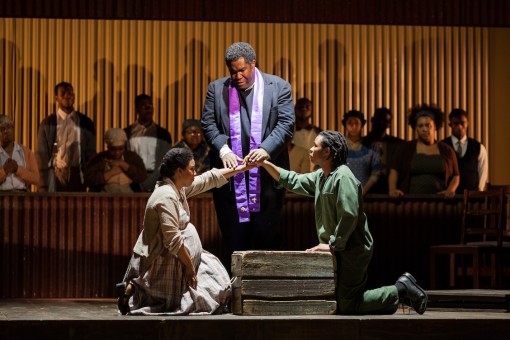Weill’s “Lost in the Stars” proves a bit lost itself at Glimmerglass

L to R: Brandy Lynn Hawkins, Eric Owens and Makudupanyane Senaoana as in Kurt Weill's "Lost in the Stars" at Glimmerglass. Photo: Karli Cadel/The Glimmerglass Festival.
After many seasons mounting four operas each summer, the Glimmerglass Festival is presenting only two operas this year, while it spends the other half of its budget on musicals.
Glimmerglass’s flirtation with musicals began in 2008 — not counting Gilbert and Sullivan operettas earlier in its history — with a staging of Cole Porter’s Kiss Me, Kate. That was prior to the tenure of Francesca Zambello as artistic director, but she has pledged to stage a musical each season, beginning with Annie, Get Your Gun last year and continuing this year with The Music Man. To make matters worse for opera fans, the fourth production this summer is Kurt Weill’s Lost in the Stars, the last musical that Kurt Weill managed to complete for Broadway in the final phase of his multifaceted career. If the trend continues this way, Glimmerglass is on its way to becoming a sort of glorified summer stock theater. Nothing wrong with summer stock musicals, if you like that sort of thing, but it is a step in the wrong direction for an opera festival seeking an international reputation.
True, in his American stage works Weill tried to blur the boundaries between musical and opera, quite intentionally attempting to conquer Broadway instead of the Metropolitan Opera. Maxwell Anderson adapted the libretto from Alan Paton’s novel Cry, the Beloved Country (1948), about a black Anglican priest in South Africa whose son is accused of killing a white man. The story satisfied Weill’s desire to write a piece for black characters, supposedly dating back to the period after his arrival in New York, when he saw a dress rehearsal of Porgy and Bess. Like Gershwin’s opera, Weill required a mostly black cast, creating the title role for baritone Todd Duncan, the original Porgy. The similarities do not end there, as Weill’s aping of Gershwin’s harmonic and melodic style sometimes sticks out like a sore thumb.
Like most musicals, Lost in the Stars stitches together a series of songs with dialogue, hitting most of the tried-and-true musical devices, like the choral montage, along the way. (The spirited musical parody Oh, Streetcar! on the television show The Simpsons, hits the same targets.)
In this production, directed by actor Tazewell Thompson for Cape Town Opera and Glimmerglass, the decision to include all of the music, including songs added later to the score, without cutting anything, makes for a long and repetitious evening in the theater. The work could be given much greater dramatic concision with about forty minutes of material removed, but that may not be possible without the agreement of the copyright holder.
The cast, bringing together Glimmerglass Young Artists with performers from South Africa, proved variable. Eric Owens, as Stephen Kumalo, holds the work together with a passable South African accent and his mellifluous baritone, not nearly as stretched by the role as Amonasro in Aida the previous night but perhaps slightly fatigued from having given three performances in two days. Tenor Sean Panikkar, as the narrating voice of the Leader, had a clean, dulcet sound, while mezzo-soprano Brandy Lynn Hawkins (as Irina, Stephen’s daughter-in-law) made the best impression among the Young Artists. Young Caleb McLaughlin made the most of an energetic, slightly shaky performance of the cute song Big Mole as Alex, Stephen’s nephew. An active chorus, choreographed by Anthony Salatino, gave its all in the crowd scenes, sometimes with an uncomfortably dated air of the cakewalk.
The not particularly inventive staging takes place against a drab backdrop of what looks like corrugated tin wall, with some partitioning elements flown in (sets and costumes by Michael Mitchell). Conductor John DeMain, pulling double-duty at the podium for both Glimmerglass musicals this year, did competent work shaping the score. The undemanding music was easily dispatched by the chamber ensemble — no violins, winds beautifully scored, with nice touches of accordion and drum kit. Certain Hollywood flourishes in Weill’s writing, like the omnipresent harp swooshes at big conclusions, quickly grew tiresom. All in all, it is probably best that opera companies leave this work exactly where Weill wanted it — on Broadway.
Lost in the Stars continues through August 25 at the Glimmerglass Festival.
Posted Aug 27, 2012 at 4:04 am by Tom Simone
Mr. Downey must be tone deaf and heartless.
Such a drab and unimaginative response to a great theatrical and human experience would seem to disqualify him for any further comment on serious matters. In this case being “lost” is in the eye and the ear of the beholder.